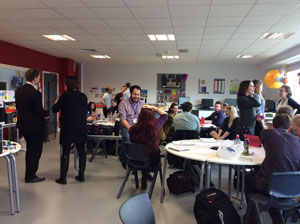Science: Unlocking potential
News and chat from the frontline of science and technology at PACA
In 1803 Dalton announced his “atomic theory”, that atoms are the building blocks of matter. However, like most new theories, it received a luke warm reception. It would take the scientific community 100 years to embrace the concept of atoms.
Robert Brown, in 1827, observed via a microscope that pollen grains when placed in a liquid darted about, and this was termed Brownian motion. In 1905 Einstein developed a mathematical formula (known as the ‘random walk’) to predict Brownian motion. He explained that as small particles (such as pollen grains) moved about in a liquid, they are being pushed about by much smaller atoms in every direction. Einstein’s predictions were then verified in experimental work carried out by Perrin in 1908 and the atomic theory was finally universally accepted.
School children are expected to understand the concept of the atomic theory within a few well planned out lessons, and regurgitate what they have learnt at the end of each lesson. If they haven’t grasped the concepts then quite frankly it’s tough, since there is an exam syllabus to get through. These children will basically be driven through the drill of passing exam questions by rote learning because there simply isn’t time. And this is why I am all for the ‘slow education’ movement (sloweducation.co.uk)

I worked in the thick of the business, target-driven culture of the ‘90s and completely signed up to efficient, effective, target-driven policies. However, this culture has spread into education, where it most definitely does not belong. A generation of school children have been reduced to a set of numbers and data representing a production line. STEM (science, technology, engineering and maths) is not target-driven; it is project based and puts the child’s learning and natural curiosity for the world around them, centre stage. It was great to be able to share our STEM ideas and successes with the next cohort of science teachers from the University of Sussex, recently. Wishing them loads of luck!




















